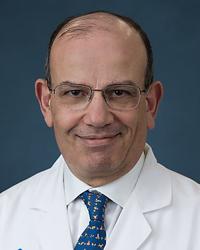Research Lab Results
-
Obesity Hypertension Clinic: Reversing the Negative Cardiovascular Effects of Weight (ReNEW)
Hypertension in children is a major cause of disease, including early onset heart disease. Up to 25% of children who are overweight or obese have hypertension (high blood pressure), and children with obesity are at greater risk for having other cardiovascular disease risk factors such as high cholesterol and diabetes. The ReNEW Clinic at The Johns Hopkins University provides an innovative multidisciplinary approach to the evaluation and treatment of obesity-related hypertension to help prevent and treat cardiovascular disease. This clinic is designed for children with elevated blood pressure (prehypertension and hypertension) and a BMI at or above the 85th percentile. Many children in this clinic are enrolled in a longitudinal registry to help researchers learn how to better care for children with multiple risk factors for heart disease.Read more about the ReNEW clinic: Childhood Obesity: A Focus on Hypertension
-
Shelby Kutty Laboratory
Shelby Kutty, M.D., Ph.D., is an authority on cardiovascular imaging, including echocardiography, magnetic resonance imaging and computed tomography of congenital heart disease. His areas of academic interest have focused on myocardial function assessment, therapeutic ultrasound and cardiovascular outcomes. Kutty’s research includes developing new imaging technology applications such as a smartphone application that uses patients’ echocardiographic images to track their progress. His work gives pediatric cardiologists better ways to predict outcomes in their patients and provide the most effective and appropriate treatments.
-
Foster Lab
The Foster Lab uses the tools of protein biochemistry and proteomics to tackle fundamental problems in the fields of cardiac preconditioning and heart failure. Protein networks are perturbed in heart disease in a manner that correlates only weakly with changes in mRNA transcripts. Moreover, proteomic techniques afford the systematic assessment of post-translational modifications that regulate the activity of proteins responsible for every aspect of heart function from electrical excitation to contraction and metabolism. Understanding the status of protein networks in the diseased state is, therefore, key to discovering new therapies. D. Brian Foster, Ph.D., is an assistant professor of medicine in the division of cardiology, and serves as Director of the Laboratory of Cardiovascular Biochemistry at the Johns Hopkins University School of Medicine. -
Hsu Lab
Our work is focused on the translational human in vivo and ex vivo assessments of right ventricular (RV) function in the setting of pulmonary hypertension. Among patients with group I pulmonary arterial hypertension PAH, those with systemic-sclerosis-associated PAH (SSc-PAH) have a particularly poor prognosis and less optimal response to PAH-guided therapy. Using in vivo pressure-volume catheterization of the right ventricle, we have uncovered key deficiencies in resting and reserve RV function in the SSc-PAH group when compared to idiopathic PAH (IPAH) patients. These studies have uncovered key discoveries with regards to right ventricular-pulmonary arterial (RV-PA) coupling in PAH. In the lab, by studying myofilament function from RV endomyocardial biopsies from these same patients, we have uncovered corresponding deficiencies in myofilament contractility and calcium sensitivity as well. Ongoing work is directed towards determining the underlying mechanism of these findings, which will hopefully lead to therapeutic applications for RV failure in SSc-PAH. Further endeavors are directed towards studying RV failure in other populations, including exercise-induced PH, PH secondary to left-heart disease, and the left ventricular assist device population.
-
Mohamed Atta Lab
Dr. Atta and his research team explore the epidemiological and clinical interventions of a variety of kidney diseases. Our goal is not only to advance the understanding of many kidney diseases but also to capitalize on novel discoveries of basic science to treat a wide range of rare and common kidney disorders.
- Multi-international observational study of a rare form of amyloid (LECT2 amyloid) to understand its natural history with the ultimate interest of treating this condition.
- Our group has launched a project investigating the impact of COVID19 on the kidney to identify risk factors influencing outcome across different clinical phenotypes
- In collaboration with the Division of Infectious Diseases and the School of Public Health, our research has focused on the epidemiology of HIV and kidney disease. We also study clinical markers and contributing factors in the progression of kidney disease, and the association between kidney disease and heart disease.
- Our research group is participating in a multicenter consortium serving as a clinical core site to study the pathogenesis of HIV-associated kidney disease by providing well-characterized clinical specimens and corresponding clinical and laboratory data.

-
Post Lab
The Post Lab is involved in the Multi-Ethnic Study of Atherosclerosis (MESA), a collaborative study of the characteristics of subclinical cardiovascular disease (that is, disease detected non-invasively before it has produced clinical signs and symptoms) and the risk factors that predict progression to clinically overt cardiovascular disease or progression of the subclinical disease. As MESA researchers, we study a diverse, population-based sample of 6,814 asymptomatic men and women aged 45-84. Approximately 38 percent of the recruited participants are white, 28 percent African-American, 22 percent Hispanic, and 12 percent Asian, predominantly of Chinese descent. Participants were recruited from six field centers across the United States, including Johns Hopkins University. Each participant received an extensive physical exam to determine a number of conditions, including coronary calcification, ventricular mass and function, flow-mediated endothelial vasodilation, standard coronary risk factors, sociodemographic factors, lifestyle factors, and psychosocial factors. Selected repetition of subclinical disease measures and risk factors at follow-up visits have allowed study of the progression of disease. Participants are being followed for identification and characterization of cardiovascular disease events, including acute myocardial infarction and other forms of coronary heart disease (CHD), stroke, and congestive heart failure; for cardiovascular disease interventions; and for mortality. Wendy S. Post, MD, MS, is an associate faculty, Welch Center for Prevention, Epidemiology, and Clinical Research, Johns Hopkins University, and a professor of medicine.



